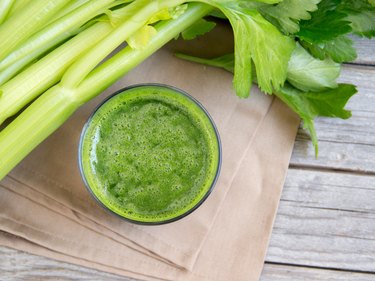Does Celery Juice Have Vitamin C

Celery juice calories and carbs, for instance, are negligible and won't affect your diet — or your waistline.
Image Credit: Karisssa/iStock/GettyImages
Vegetable juices are the go-to choice for low-carb dieters. Celery juice calories and carbs, for instance, are negligible and won't affect your diet — or your waistline. Refreshing and full of flavor, this beverage has little sugar and packs a hefty nutritional punch.
Raw celery is more than 95 percent water. This means it keeps you hydrated and fills you up quickly, making weight loss easier. Its juice is just as healthy and nutritious, but lower in fiber.
Celery Juice Nutrition Facts
This low-carb vegetable juice has emerged as a miracle weight loss aid. Proponents say that celery contains negative calories, meaning that it takes more energy to digest than it provides.
Unfortunately, this is just a myth. While it's true that chewing and digesting food requires energy, the calorie burn is negligible.
As the International Food Information Council Foundation points out, there is no such thing as negative calories. However, researchers agree that some foods falling into this category are high in water and fiber, so they may help with weight loss. They're typically low in calories and may not provide enough energy to keep you functioning at your peak. The key is to consume them as part of a balanced diet.
Raw celery has only 18 calories per serving (3.8 ounces), according to the USDA. It's actually one of the most popular "negative-calorie" foods, although there is not enough evidence to confirm its fat-burning effects. What makes it stand out is its low carb content and high nutritional value. Each serving of celery provides:
- 0.8 grams of protein
- 3.3 grams of carbs, including 1.8 grams of fiber
- 1.5 grams of sugars
- 0.2 grams of fat
- 3 percent of the DV (daily value) of calcium
- 3 percent of the DV of magnesium
- 6 percent of the DV of potassium
- 5 percent of the DV of manganese
- 27 percent of the DV of vitamin K
- 4 percent of the DV of vitamin C
- 10 percent of the DV of folate
- 3 percent of the DV of vitamin A
This veggie is also a good source of vitamin E, beta-carotene, lutein and zeaxanthin. Your body needs these antioxidants to fight oxidative stress.
Vitamin E, for example, protects the skin from free radicals, inflammation and UV-induced damage. Lutein, a potent antioxidant, has anti-inflammatory properties and supports eye health, according to a September 2018 review published in the journal Nutrients. Some studies suggest that it may protect against cataracts, age-related macular degeneration and oxidative-based eye diseases, but more research is needed to validate these findings.
Celery juice calories depend largely on the ingredients used. If you prepare this beverage with two small stalks of celery, you'll get around 4 calories and 1 gram of carbs. Some recipes call for ginger, lemon or lime juice, green apple and other ingredients, so they're higher in calories.
Is Celery Juice Keto-Friendly?
Low in carbs, this beverage fits perfectly into the keto diet. Enjoy it first thing in the morning or anytime through the day to boost your nutrient intake. In fact, many vegetable juices may be keto-friendly. They do contain less fiber than whole veggies, though.
The ketogenic diet is very restrictive in terms of food choices. Most versions limit carbs to about 50 grams per day. Starchy vegetables, whole grains, legumes and fruit juices are typically not allowed because of their high carb content. Sure, you can enjoy them in small amounts, but your meals will be largely based on meat, fish, high-fat dairy and eggs.
Celery contains vitamins, minerals and phytonutrients that are not found in animal foods. For example, one serving provides 4 percent of the daily recommended vitamin C intake. Roasted chicken breast, by contrast, has no vitamin C. Eggs, another keto diet staple, lack this nutrient too.
Your body needs vitamin C to fight inflammation, free radicals and infections. This nutrient supports immune function and tissue repair. Additionally, it may help protect against gout, heart disease and other disorders with an inflammatory component, reports the Linus Pauling Institute.
Celery and its juice are also rich in antioxidants, including saponins, ferulic acid, p-coumaric acid and kaempferol. According to an October 2017 review in the Journal of Evidence-Based Complementary & Alternative Medicine, this veggie is a good source of flavonoids, limonene, caffeic acid and alkaloids. Studies suggest that it may lower the risk of heart and liver diseases, prevent inflammation and boost antioxidant levels in the bloodstream.
Potential Benefits of Celery Juice
This beverage is unlikely to speed up weight loss or boost your metabolism, as its proponents claim. As mentioned earlier, current research doesn't support the theory behind negative calories.
However, celery and other low-carb veggies are a healthy substitute for conventional snacks. Their juice is a good alternative to soda and even fruit juices, which have been linked to obesity, diabetes and other related conditions.
Take fruit juice, for example. A May 2019 cohort study published in JAMA Network Open suggests that each additional daily serving of fruit juice may increase the risk of premature death by 24 percent. As the researchers note, fruit juices contain just as much sugar as soft drinks. Vegetable juices, on the other hand, contain little or no sugar.
Anecdotal evidence says that celery juice improves digestion, boosts your energy, slows down aging and more. Many of these claims lack scientific proof. However, celery does boast high doses of vitamins, minerals and phytochemicals with proven health benefits.
Apigenin, one of its primary compounds, has been linked to a lower risk of cancer, arthritis and neurodegenerative diseases. According to a December 2016 research paper featured in the International Journal of Food Properties, this flavonoid may protect against autoimmune disorders, liver toxicity, inflammation and cardiovascular problems. These effects are attributed to its antioxidant properties.
Most studies, though, have been conducted on animals or in vitro (a controlled lab environment). Therefore, human trials are needed to confirm these findings.
Celery juice is also rich in vitamin K. In fact, a single serving of celery delivers nearly one-third of the daily recommended vitamin K intake. This nutrient aids in blood clotting and promotes bone health.
Your body can store only 30 to 40 percent of the vitamin K from food. Therefore, it's important to eat plenty of leafy greens, celery, soybeans and other foods that contain this nutrient. Low levels of vitamin K in the bloodstream may increase your risk of bleeding and bone loss. Celery juice can make it easier to increase your vitamin K intake and get more antioxidants in your diet.
Does Celery Juice Have Vitamin C
Source: https://www.livestrong.com/article/378821-nutritional-facts-for-celery-juice/

